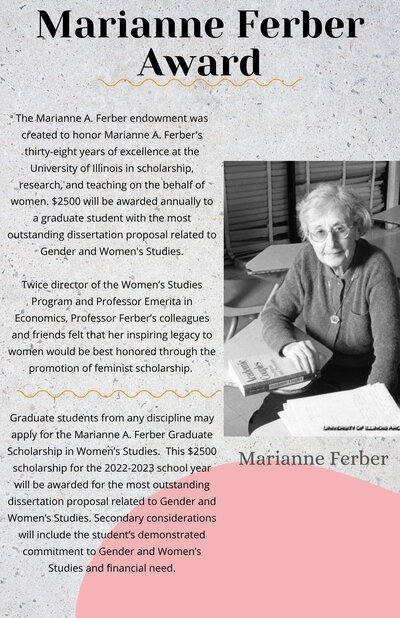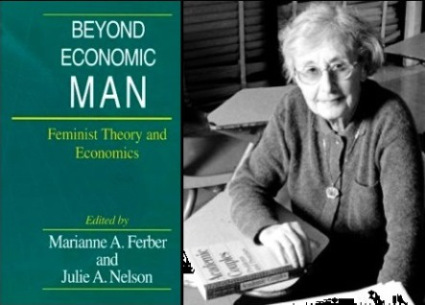
Applicants are asked to complete the application. Also submit a letter of support from your dissertation advisor to Tasha Robles at tmatos@illinois.edu.
The PDF below offers some basic guidance on the elements that a strong dissertation proposal should include.
Deadline: March 1
Previous Award Recipients:
2025 Kshitij Tewari, Recreation Sports & Tourism, "Intersectional Thirdspaces: Exploring Diverse LGBTQ+ Individuals’ Experiences in Outdoor Recreation Spaces"
2024 Lázaro Garcia-Angulo, "Otra mujer-hombre1”: Representations of Gender Nonconformity in Spain, 1880-1939." and
Priyanka Zylstra, "Feminism, Activism, and Resistance: South Asian Women in Multi-Racial Britain, 1975-1993."
2023 Britni Moore, "Becoming the Good Guy: Police Recruits and the Discursive Construction of ‘Real Rape’ in Sexual Assault Training."
2022 Nehal Elmeligy, Sociology, "Emergent Publics in the Time of Unpredictable Crackdowns: How Feminist Consciousness-raising and Embodied Knowledge Production Initiatives Create Counterpublics in Contemporary Egypt."
2021 Miren Anton, Spanish and Portuguese, "Queer Heterotopias: Online and Offline Communities and Civic Crisis in Chile and Spain."
2020 Shwetha Delanthamajalu, Sociology, "Moral Panics and Policing of Sex and Love in the Time of Hindutva."
2019 Megan Gargiulo, Spanish and Portuguese, "Race, Gender, and Recogimiento: Discursive Negotiations of Space, Sexuality, and Productivity in Late Colonial Mexico."
2018 Saniya Ghanoui, History, "Hot-Blooded Teens and Silver Screens: Transnational Sex Education between the United States and Sweden, 1910-1960s."
2018 Taylor-Imani A. Gates, Educational Policy Studies, "Revolutionary Mothering: Black Mothers' Coping and Resiliency in Englewood."
2017 Christine Peralta, History, "Medical Modernity: Rethinking U.S. Colonial Practices in the Philippines and the Health Work of Non-elite Women (1870-1948)."
2016 Paul Michael Leonardo Atienza, Anthropology, "Mobilizing Digital Selves: Tracking Queer Intimacies and Fleeting Socialities in Mobile Apps of Gay Filipino Diasporas."
2015 Shantel Martinez, Institute of Communications Research, "Haunted belongings: Testimonios of body and home as autoethnography."
2014 Molly Hyo J. Kim, Institute of Communications Research, "Women at 'Disposal': Censorship, Gender and Culture of South Korean Hostess Films (1974-1982)."
2013 Amaziah Zuri Finley, Department of Anthropology, “’They Want to Wash Us Out…We Ain’t Going Nowhere”: Black Women, Vulnerability, and Resistance in Post-Katrina, New Orleans.”
2012 Jungmin Kwon, Institute of Communications Research, “Spectacularizing the queer body: When Korean straight females appeared.”
2011 Ozge Sensoy Bahar, School of Social Work, “Low-income Kurdish mothers’ experiences with displacement to a metropolitan city: Challenges, coping strategies, and aspirations.”
2010 Genevieve Clutario, Department of History, , “Woman Enough?”: Constructing Filipina Womanhood, Filipino Nationalism, and Empire.”
2009 Kerstin Rudolph, Department of English, “The Race for the Real: Representations of Black Womanhood in American Literary Realism, 1868-1900.”
2008 Emily Skidmore, Department of History, “Exceptional Queerness: Defining the Boundaries of Normative U.S. Citizenship, 1875-1936.”
2007 Jillian M. Báez, Institute of Communications Research, “Between Spectacular and Ordinary Bodies: A Discourse Ethnography of the Latina Body and Popular Culture.”
2006 Jin-kyung Park, Institute of Communications Research,
2005 Robin E. Jensen, Department of Communication, “Challenging Beliefs about Sex: The Gendered Rhetoric of Sexual Education Campaigns during the Progressive Era.”
2004 Sherita Johnson, Department of English, “’Truth is Stranger than Fiction’: Realities and Representations of Black Women in American Literature of the South.”
2003 Diya Kallivayalil, Department of Psychology, “Mental Health Outcomes of South Asian Immigrant Survivors of Domestic Violence.”
2002 Dawn Flood, Department of History, “Proving Rape: Sex, Race, and Representation in Chicago Trials and Society, 1937-1969.”
2001 Jesook Song, Department of Anthropology, “South Korean ‘Productive Welfarism’ 1997-2000: The Reproduction of Heteronormative Familism.”
2000 Elsa Beatriz Padilla, Department of Sociology, “Women’s Organizing in a Global Context: Activism Crossroads of Race, Class and Gender in Salvador, Brazil.”
1999 Nicole Ranganath, Department of History, “Wedding Women to Tradition: Marriage in the South Asian Diaspora, 1965-1990.”
1998 Michelle C. Johnson, Department of Anthropology, “Contextualizing the Excision Debate: Women’s Initiation and Personhood in Guinea-Bissau.”
